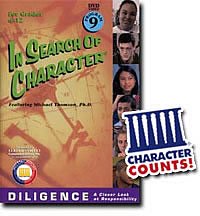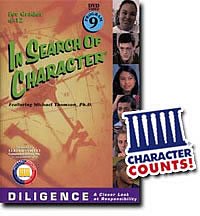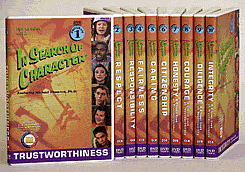This material is from the teaching guide
for the video “Diligence“
in the 10-part DVD series In Search of Character
Are You a Diligent Person?
(Take this self-evaluation and decide for yourself.)
| True | False | |
| I always do my best; I strive for excellence. | ||
| I am willing to risk failure for a worthy goal. | ||
| I am self-disciplined. | ||
| I make sure to learn from my mistakes and failures. | ||
| I try to see the big picture and think long term. | ||
| I set goals and stay focused. | ||
| I don’t give up just because things seem difficult. | ||
| I don’t procrastinate. | ||
| I think I am / am not a diligent person because: ___________________ | ||
“Diligence is the mother of good luck.”
– Benjamin Franklin
(If you wish to copy or use any material from this website, please click here for Terms of Use.)
DISCUSSION QUESTIONS
If you are using the video, ask questions 1&2 before viewing.
1. Successful people get that way by being lucky. Agree, or disagree? Explain.
2. If I try hard and don’t succeed it’s not my fault. Agree, or disagree? Explain.
3. How did the documentary (in the video) about Annie Henning make you feel? What can you learn from it? Did it give you any insights into yourself, or affect the way you view your own life? How do Annie’s obstacles compare with your own?
4. What qualities does Annie have that will help her in reaching her goals?
5. Does attitude have anything to do with success? If so, what?
6. How do your expectations about yourself affect what you will accomplish?
This material is from the teaching guide
for the video “Diligence“
in the 10-part DVD series In Search of Character
7. At the end of the program, Dr. Mike’s co-host, S.E., mentioned an old saying that “Whether you think you can or think you can’t, either way you’re right.” What does that mean? How true is it?
8. In the passage that Dr. Mike read from Thomas Edison’s biography, Edison appears to see failures as successes. How can a failure be a success?
9. What do you think causes some people to give up and stop trying? Do you ever do that? Why, or why not?
10. Keith (the caller) says a coach once told him that his biggest obstacle is himself. What does that mean? Have you ever felt that way?
11. One boy in the video suggests that it is better to set high goals that are challenging rather than low goals that are easy. Do you agree? Why bother? How can that help you?
12. One boy in the video said that discipline equals self-respect plus motivation. Do you agree with this equation? How can you apply it to your own experience?
13. Have you ever felt that pressures from your peers prevented you from accomplishing something you wanted? Have you ever been affected by negative comments people have made about your abilities? What can you do about these kinds of external pressures when they get in the way of your success?
14. What is diligence? What is discipline? What is perseverance? How would you rate yourself in each of these areas? How could you improve?
15. How could you personally benefit by becoming a more diligent person?
16. Did this video present any ideas you disagree with?
(If you wish to copy or use any material from this website, please click here for Terms of Use.)
|
|
To find elementary and middle school teaching guides on topics related to Diligence,
click here. |
 |
This material is from the teaching guide
for the video “Diligence“
in the 10-part DVD series In Search of Character
WRITING ASSIGNMENTS
1. Pick any question from the discussion questions (above) and write an essay on it.
2. How diligent are you? For each of the behaviors listed below, write a thorough evaluation of yourself:
b. I am willing to risk failure to accomplish a higher goal.
c. I am self-disciplined.
e. I look at the big picture; I think long-term.
g. I don’t give up just because things seem difficult.
i. I don’t procrastinate.
3. Write about an event in your life in which you succeeded at something which was very challenging. How much did any of the above listed behaviors contribute to your success? What did you learn from that?
4. Make a chart of the things in your studies that are easy for you and those things that seem difficult. Now write out a plan for what you can do to overcome your difficulties.
5. How has negative or positive peer pressure played a role in your successes and failures?
6. Benjamin Franklin said, “Diligence is the mother of good luck.” What does that mean? How true is it?
(If you wish to copy or use any material from this website, please click here for Terms of Use.)
Other teaching guides in this series:
 |
• Trustworthiness • Respect • Responsibility • Fairness • Caring |
• Citizenship • Honesty • Courage • Diligence • Integrity |
 |
STUDENT ACTIVITIES
1. Brainstorm ways in which you can all become more disciplined in school. Discuss the problems students face, such as procrastinating and cutting classes. Make a list of the skills and attitudes needed for students to take more responsibility for their own learning, and to reach their goals.
2. Select someone in your community who exemplifies the quality of diligence. Invite this person to speak to your class about his/her own background, any obstacles overcome, and the factors that led to his/her success.
3. Break up into small groups, and conduct a survey in your school, asking questions like these: Where do you want to be in five years, in ten years? What are you now doing to get to where you want to be? What are the most serious obstacles that prevent people from accomplishing their goals? Share what you have learned from this process with the entire class.
4. As a group, research Thomas Edison’s life. See what general principles you can glean from his methods and work habits that you can apply to your own studies. Make a list of these principles, and present them in the form of a bulletin board or as a group report.
5. As a group, research resources in your school and in your community that will provide support for students who are having difficulty in their studies. Assemble these resources into a folder and distribute it to all class members. Perhaps share this information with other classes.
(If you wish to copy or use any material from this website, please click here for Terms of Use.)
This material is from the teaching guide
for the video “Diligence“
in the 10-part DVD series In Search of Character
In this program we look at what it means to be diligent and what a potent force diligence brings into our lives. Learn more . . .
Click play for a sampling of
“In Search of Character”
The Series
This award winning video series spotlights ten core virtues that help teens develop into caring, respectful, responsible people who make choices based on what’s right, rather than what they can get away with.
Learn more . . .
For more information about individual videos in this series, click on the title below.
• Respect
• Responsibility
• Fairness
• Caring
• Citizenship
• Honesty
• Courage
• Diligence
• Integrity
If your school or organization does not have these videos, you can purchase them from Live Wire Media, or request them from your local library.
![]()
Monthly Newsletter
Get breaking news and developments in character education and helpful tips and ideas that you can use with your own character education program.
View this month’s newsletter.




